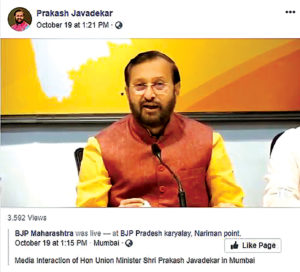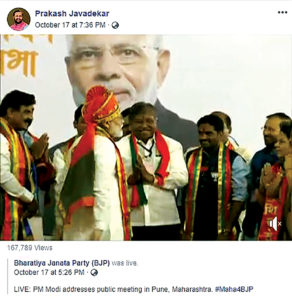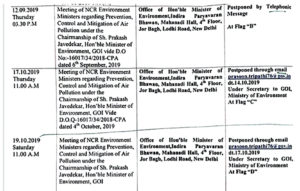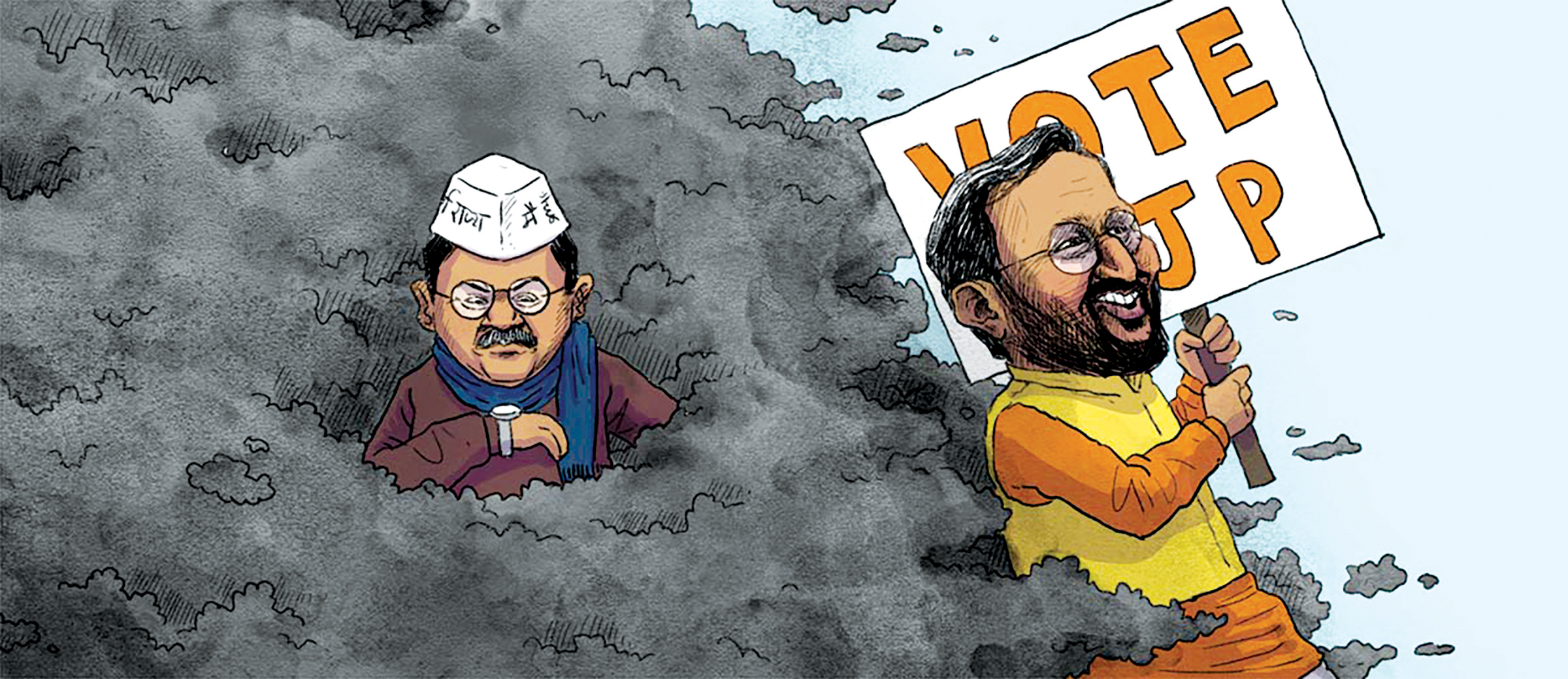India’s environment minister postponed three meetings scheduled to discuss the ‘prevention, control and mitigation of air pollution’ in September-October
On November 4, Aam Aadmi Party leader Atishi accused Union Environment Minister Prakash Javadekar of “cancelling” three meetings regarding “prevention, control and mitigation of air pollution” in the National Capital Region with the environment ministers of Delhi, Haryana and Uttar Pradesh. The meetings had been scheduled in September and October.
Javadekar’s Bharatiya Janata Party denied the claim. RP Singh, a spokesperson for the party, told India Today, “No such meetings were cancelled.”
Newslaundry, however, can confirm that Javadekar did cancel two of the meetings so as to be able to campaign for his party in the run-up to the Maharashtra Assembly election.
According to official records accessed by Newslaundry, Javadekar had scheduled a meeting with the environment ministers of Delhi, Haryana and Uttar Pradesh — the NCR states — on September 12. It was to be held in his office at the Union Ministry of Environment, Forest and Climate Change in Delhi’s Jor Bagh.
The ministry later postponed the meeting until October 17 through a “telephonic message”. Three days before it was to be held, the October 17 meeting too was postponed, until October 19. That too met the same fate. Deputy Chief Minister Manisha Sisodia of Delhi claimed earlier this month that the meetings were “cancelled” from Javadekar’s end.

“Postponed is the word used by the environment ministry. These meetings actually never happened,” Jasmine Shah, vice chairperson of the Dialogue and Development Commission, an advisory body to the Delhi government, pointed out.
Newslaundry asked the environment ministry for comment on the ‘postponement’ of the meetings. While the ministry didn’t respond, an official confirmed that Javadekar had scheduled and then postponed the meetings.
Javadekar didn’t hold any of the meetings, it turns out, because he was busy attending international events and campaigning for the BJP in Maharashtra. His digital footprints show the minister zooming between Pune and Mumbai on October 16-17.
On October 16, Javadekar spoke at a press conference in Mumbai where he addressed the Congress party’s concerns about trees being felled at a Pune college the day before Prime Minister Modi was to hold a rally there.
The next day, Javadekar was supposed to speak with the environment ministers of the NCR states in his Delhi office at 11 am before his ministry “postponed” the meeting. By 5 pm that day — as this video shows — he was at the prime minister’s rally in Pune. He appears on stage at the 36:30 mark. The video is from a live broadcast of the event by the BJP’s Facebook page.
The meeting was rescheduled to 11 am on October 19. It didn’t happen. That day, at around 1 pm, Javadekar was addressing a press conference in Mumbai, as another video livestreamed on the BJP’s Facebook page shows.

On September 12, when the first meeting with the NCR states’ ministers was scheduled, Javadekar wasn’t on the campaign trail. He was presiding the Conference of the Parties to the United Nations Convention to Combat Desertification. The conference was held in Greater Noida, Uttar Pradesh, between September 2 and 13.
The letters
On September 26, Delhi Chief Minister Arvind Kejriwal wrote to his Punjab and Haryana counterparts, Amarinder Singh and Manohar Lal Khattar, stating that the problem of air pollution called for “bold, urgent action”.
“There is little that the people of Delhi can do to fight pollution due to crop stubble burning happening in Punjab and Haryana, which is a major contributor to pollution in Delhi in the months of October and November,” read Kejriwal’s letter to Singh. “We understand and appreciate the several initiatives that the Government of Punjab is taking in this regard but I am sure you will agree that much more needs to be done.”
The letter continued: “It is my earnest request that the Government of Punjab take all possible steps to ensure there’s an immediate curb on crop stubble burning activities this year.”
Kejriwal sent a similar letter to Javadekar, requesting the “Government of India, together with Punjab and Haryana governments”, take steps to curb stubble burning.
A Delhi government official told Newslaundry that none of these letters elicited a response.
Newslaundry wrote to the Union environment ministry as well as the state governments of Punjab and Haryana to confirm this. This article will be updated if they respond.
According to the Punjab Remote Sensing Centre, 42,676 fire events were reported from across the state between September 23 and November 6. The Haryana State Pollution Control Board data shows about 5,181 incidents of stubble burning occurred between September 25 and November 5.
Between October 17 and 19, when Javadekar was in Mah-arashtra, 753 fire events were reported from Punjab and 449 incidents of rice stubble burning from Haryana.
On November 3, Amarinder Singh accused Kejriwal of “playing political games” and questioned what he had done to address the problem of air pollution. In contrast to Kejriwal, Singh claimed, his government had initiated action against 2,923 farmers in 20,729 cases of stubble burning reported until November 1.
On his part, Khattar claimed that apart from stubble burning, construction activities, vehicular traffic and waste burning contributed to air pollution. So, he added, states should “refrain from playing the blame game.”

On November 4, the Supreme Court asked the governments of Punjab, Haryana and UP to explain why they should not be made to pay compensation for their “failure” to prevent stubble burning. The court also pulled up the Delhi government for “not performing their duties as enjoined upon them”.
According to a study done earlier this year by Stockholm University and the Indian Institute for Tropical Meteorology, emissions from the burning of stubble or other biomass in rural areas around Delhi contribute “nearly half of the airborne black-carbon particulate matter”, or soot, in the capital during autumn and winter. The remaining pollution originates from the burning of fossil fuels such as by cars and trucks, the study noted.
www.newslaundry.com





